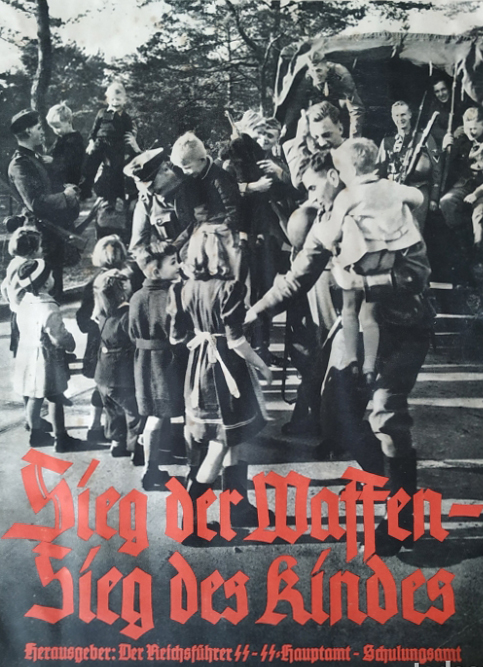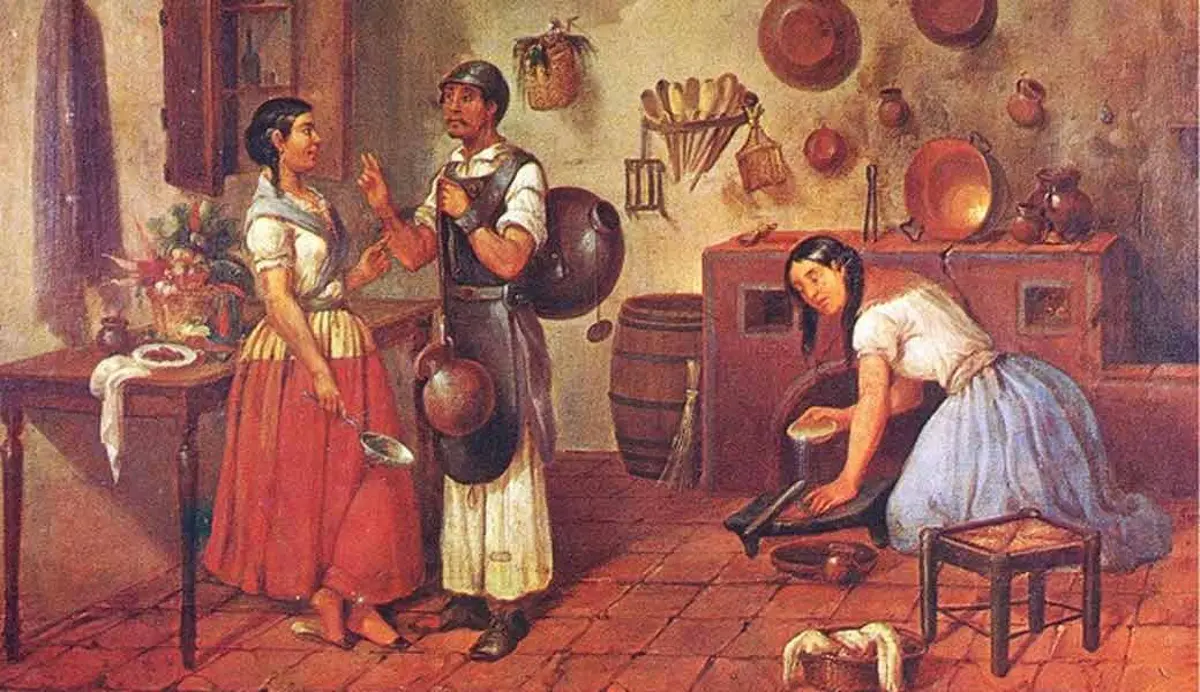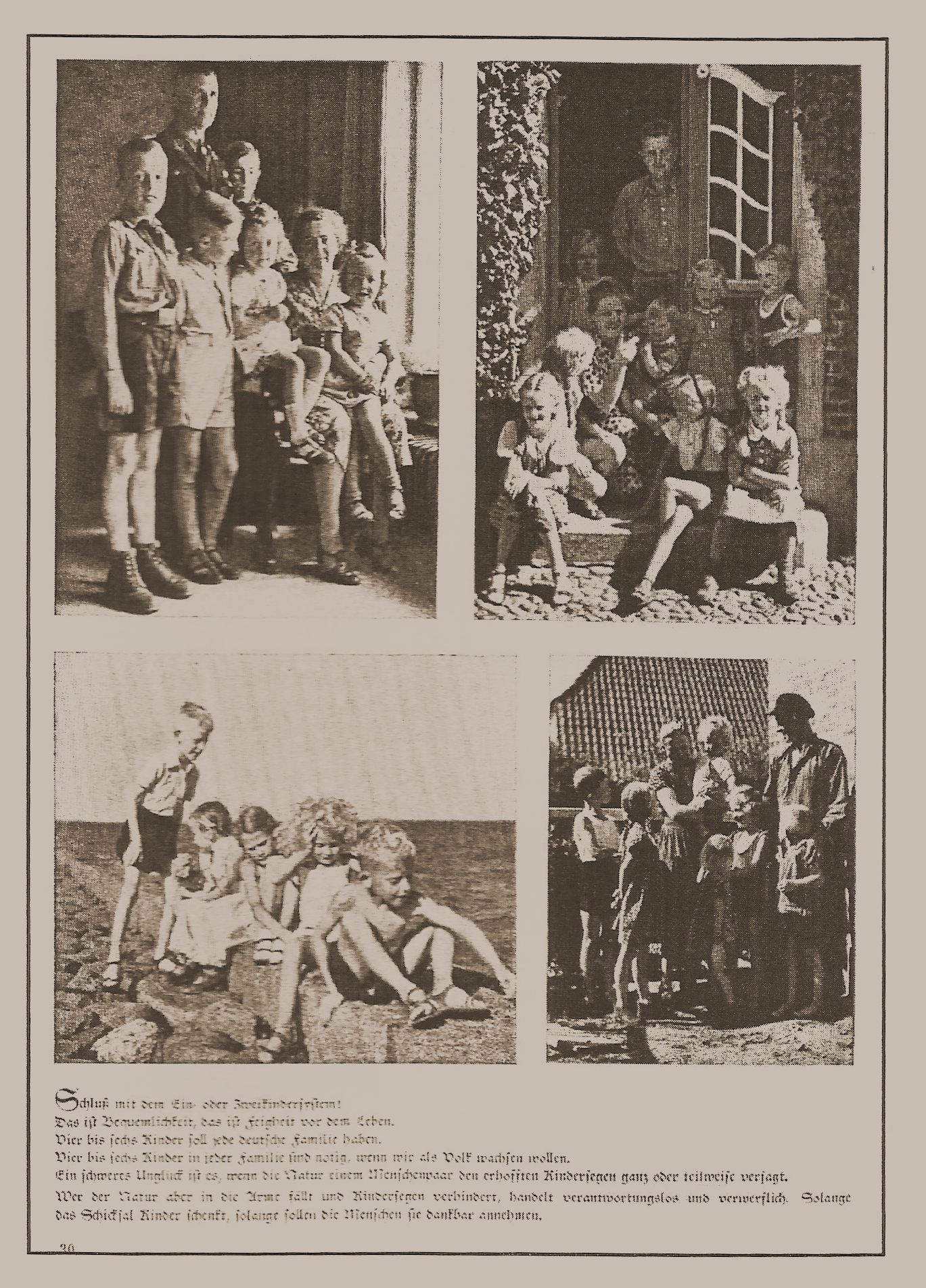Author: C .T.
SS booklet, 12
In a talk of 15 January 1942, the Führer alluded to the alarming increase in the population of India: an increase of fifty-five million in ten years[1], all the more alarming, one might say, because in this remote and last bastion of a properly Aryan religious and metaphysical tradition, it is the low castes, the aborigines and Eurasians—the non-Aryans and half-breeds—who are multiplying at the most insane rate, while the few millions of Aryans who have succeeded for sixty centuries in surviving more or less purely in a vast multiracial atmosphere, represent a growing minority.
______ 卐 ______
Editor’s Note: Savitri lived there and was married to one of them. If she didn’t depend on them, she would have said that they are all mudbloods now.
______ 卐 ______
The few millions of Aryans who have managed to survive, more or less, for sixty centuries in a vast multiracial environment, represent an ever-smaller minority, and enjoy (and already enjoyed in 1942), thanks to the parliamentary system introduced by the British, less and less political influence. But this tragedy didn’t concern Germany at war. The Führer continued: ‘We are witnessing the same phenomenon in Russia: women there have a child every year. The main reason for this increase is the decrease in mortality due to the progress of hygiene. What are our doctors thinking about?’ [2]
Here we are dealing with the direct threat of indefinitely increased masses, which risk submerging and dissolving in their bosom the future German colonists of the Eastern Marches and, in the meantime, softening the combatants of the German army who are the least detached from the human-too-human; Aryan masses, no doubt but not Germanic, and which the fate of history has set against the Germans from the Middle Ages onwards, and later on, sometimes mixed with Mongolian blood. This is a danger for the German people and for the balance of the new world that the Führer dreamed of founding: the pan-European, if not pan-Aryan, Empire dominated by Germany.
Adolf Hitler wanted to avert this danger, and he was well aware that banning preventive hygiene measures wouldn’t be enough. Therefore, according to Rauschning’s report, he had envisaged more radical measures—still in the spirit of the immemorial Law of the Jungle, the ‘struggle for life’, which the superior man has to apply above all to other men of inferior quality because they are his real rivals on earth: they, and not the noble beasts, aristocrats of the forest, savannah or desert nor the trees, the ornament of the soil.
‘Nature is cruel’, declared the Fighter against Time, ‘so we have the right to be too. At the moment when I am going to throw into the hurricane of iron and fire the flower of Germanism, without feeling any regret for the precious blood that is going to flow in torrents, who could dispute with me the right to annihilate millions of men of inferior races who are multiplying like insects, and whom I shall not, moreover, exterminate, but whose growth I shall systematically prevent—for example by separating men from women for years’?[3]
______ 卐 ______
Editor’s Note: Wow and triple wow!
I have long fantasised that the Europeans who conquered the Americas should have taken all the Indian males to the Atlantic shores and all the Indian females to the Pacific shores (of course: interbreeding is forbid). I never imagined that the Führer had toyed with a similar idea…
But this is where it is seen that Christianity, a thousand times more than Judaism, is the Great Enemy of the white race. The church of Rome sent its friars to catechize the natives, to equalise them to the Iberian white through the sacred sacrament of marriage.
The rest is history. The West’s Darkest Hour is ignored by the racialist right for the simple fact that they don’t want to see something so obvious. Savitri continues:
______ 卐 ______
And again: ‘For so many centuries we have been talking about the protection of the poor and miserable. The time has perhaps come to preserve the strong, who are threatened by their inferiors’.[4]
______ 卐 ______
Editor’s Note: When the slogan of the American white nationalist reads ‘Umwertuung aller Werte’ in German, not in English, we will know that the movement will have reached its maturity.
______ 卐 ______
Finally, it is hardly necessary to recall that this ‘directed economy of population movements’[5] through which he hoped to be able, outside the Germanic world, to check the tendency to overpopulation characteristic of the Dark Ages, represented only one aspect of his activity against the trends of this Age. A parallel, more visible and more brutal action—such as the much-maligned and misunderstood Einsatzgruppen—was later to complement it.
While all the Führer’s wisdom must be presented as a return to the Eternal Principles, his methods are reminiscent of those of antiquity, in the total absence of ‘conscience’ and hence of remorse, both in him, who was responsible for them, and in the men who applied them.
The suppression of human waste among his people is reminiscent of the summary treatment in Sparta of unwelcome newborns, whom the ephors deemed unworthy of being raised. And the action of its Einsatzgruppen in Poland and Russia—among the plethora of enslaved populations always ready to revolt—is singularly reminiscent of that of the merciless Spartan krypteia among the Helots. Both were, above all, actions of preventive defence implemented against a swarming of defeated people that the mere awareness of their numbers incited to raise their heads, and that nothing could push them to set up a force against their conquerors.
An enthusiastic statement by the Führer shows, moreover, better than long comments, his eminently revolutionary attitude and his contempt for the modern world—which he knew, anyway, doomed and which he dreamed of destroying: ‘Well, yes, we are Barbarians, and we want to be Barbarians. It is a badge of honour. We are the ones who will rejuvenate the world. The present world is near its end. Our only task is to tear it down.[6] That is, to destroy it in order to build on its ruins a world in accordance with eternal values, with the original meaning of things. [7]
___________
[1] Libres propos sur la Guerre et la Paix (op. cit) page 203.
[2] Ibid.
[3] Hermann Rauschning, Hitler m’a dit, (op. cit), pp. 159-60.
[4] Ibid. p. 160.
[5] Ibid.
[6] Ibid.
[7] Mein Kampf, German edition 1935, page 440.
SS booklet, 11
But that is not all. One of the most depressing features of the Dark Age drawing to a close is, certainly, the disorderly proliferation of man.
______ 卐 ______
Editor’s note: From my childhood I became a racist when we would visit the centre of the great mongrel metropolis. What my eyes saw is what I’d eventually come to call ‘the Neanderthal marabunta’.
______ 卐 ______
Malthus, more than a hundred and fifty years ago, had already pointed out the dangers of this, but only from an economic point of view. Our optimists today try to answer him by evoking the new possibilities of exploiting the land, and even the sea, which, according to them, would allow the human population of the planet to increase fivefold or even tenfold without worry. But the dangers remain, and are becoming more and more apparent, because the overall increase in the number of people is no longer ‘arithmetical’ but geometrical. And it seems that now, more than a quarter of a century after the defeat of National Socialist Germany, the point has been reached beyond which nothing, other than a gigantic external intervention, human or divine, can stop it, and even more so to decrease the world’s population to the level where it would cease to endanger the natural balance.
______ 卐 ______
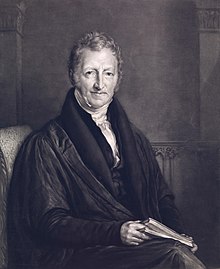 Editor’s note: So far my insistence on pointing out Chris Martenson’s course (summary: here) has not made a dent in the racialists’ worldview. Savitri ignored scientific data on what now is called peak oil because neo-Malthusian studies weren’t yet popular. Never mind that Martenson and others who talk about energy devolution are normies. What matters is whether their calculations are correct. As I have also said several times, among the racialists only the Austrian-Canadian Ernest Ronin has predicted that when energy devolution hits the fan, later in this century, a window of opportunity will open for our cause.
Editor’s note: So far my insistence on pointing out Chris Martenson’s course (summary: here) has not made a dent in the racialists’ worldview. Savitri ignored scientific data on what now is called peak oil because neo-Malthusian studies weren’t yet popular. Never mind that Martenson and others who talk about energy devolution are normies. What matters is whether their calculations are correct. As I have also said several times, among the racialists only the Austrian-Canadian Ernest Ronin has predicted that when energy devolution hits the fan, later in this century, a window of opportunity will open for our cause.
______ 卐 ______
The Führer, more than anyone else, was aware of the catastrophe that the overpopulation of certain regions of the earth already represented (and increasingly does represent), and not only because of the inevitable push, in the more or less short term, of the ‘hungry’ against the ‘haves’. What he feared most of all was the gradual disappearance of the natural elites, the racial elites, under the rising tide of biologically inferior multitudes, even if here and there some dikes could be erected to protect us. For it is to be noted that, at least in our time, it is generally the least beautiful and least gifted races, and within the same people the less pure elements, that are the most prolific.
What the defender of the Aryan elite also feared was the lowering of the physical, intellectual and moral standards—the loss of quality—of generations to come. This is, in fact, a result, statistically fatal, of the unlimited increase in the number of humans, even of the ‘good race’, as soon as natural selection is undermined by the widespread application of medicine, surgery and especially preventive hygiene: factors of reverse selection.
Thus, his programme for the purification of the German people (and, if he had won the war, of the peoples of Europe) included, in parallel with the sterilisation of incurable people who were able, despite of everything, to justify their existence by some useful work, the pure and simple physical elimination (without suffering, that is to say) of beings who were only human in the form such as monsters, idiots, mentally retarded people, lunatics, etc.
______ 卐 ______
Editor’s note: This reminds me of something funny. A few years ago, on a typical American white nationalist forum, a commenter said with conviction that the Third Reich’s eugenics programme was just another slander, similar to the holocaust myth. That happened a few years ago. What these folk didn’t realise, and still don’t get it, is that the Reich represented a transvaluation to pre-Christian values. In other words, axiologically the anti-Semites on the continent where I live are still Jew obeyers, a term I explained a couple of days ago.
______ 卐 ______
It was conceived in the sense of a definitive return to healthy Nature, which prompts the bird to throw the malformed chick out of the nest; also, in the spirit of the breeder who, from the litters of his female dogs or mares, removes and eliminates without hesitation the deformed subjects, or those too weak to survive without constant care. It was conceived in the spirit of the divine Lycurgus, the lawgiver of Sparta. And it is known that Lycurgus’ laws were dictated to him by the Apollo of Delphi, the ‘Hyperborean’.
Unfortunately, this programme was only just beginning to be implemented. The fierce opposition of the Christian churches, both Catholic and Protestant, resulted in a ‘postponement’ of the drastic measures it contained. Adolf Hitler was too much of a realist to confront head-on, in the midst of war, the prejudices that eleven hundred years of Christian anthropocentrism had embedded in the psyche of his people, and to brave the indignant sermons of a few bishops, such as von Galen of Münster. It would have been difficult to put these prelates (and this one in particular) under arrest without risking a highly inappropriate disaffection with the regime among their flock. This is how (among others) the ten thousand or so mentally retarded in the Bethel asylum near Bielefeld survived the fall of the Third Reich. I repeat: unfortunately.
It remains true that the physical elimination of human waste was, together with the sterilisation of the incurably ill but still ‘usable’ as ‘economic factors’, an essential aspect of Adolf Hitler’s fight against decadence. The pure and simple suppression of medicine and preventive hygiene was, logically, another aspect. And it would, no doubt, have been another aspect in a victorious Germany which would have dominated Europe, and would have had nothing to fear from the threat of prolific multitudes, massed in the East, under the command of leaders who had identified the old cause of Panslavism with that of Marxism-Leninism.
But, given the tragic reality of this threat—and the threat represented, in the longer term, and for quite different reasons, by the overpopulation of the whole Earth—it was first of all this foreign proliferation that putting a brake was needed.
SS booklet, 10
‘Ten to fifteen children in one family was nothing unusual among our Germanic ancestors… This river of life must not dry up… The land of the Germans must again become the land of the children!’
______ 卐 ______
 Just compare the above quote from Sieg der Waffen, Sieg des Kindes to what Joe Biden said in the US. Tucker Carlson quoted a clip where Biden craved for ‘an unrelenting stream of immigration’. But why, asked Carlson? ‘Well, Joe Biden just said it, to change the racial mix of the country’. And he added on Fox News: ‘That’s the reason: to reduce the political power of people whose ancestors lived here, and dramatically increase the proportion of [those] newly-arrived from the third world’.
Just compare the above quote from Sieg der Waffen, Sieg des Kindes to what Joe Biden said in the US. Tucker Carlson quoted a clip where Biden craved for ‘an unrelenting stream of immigration’. But why, asked Carlson? ‘Well, Joe Biden just said it, to change the racial mix of the country’. And he added on Fox News: ‘That’s the reason: to reduce the political power of people whose ancestors lived here, and dramatically increase the proportion of [those] newly-arrived from the third world’.
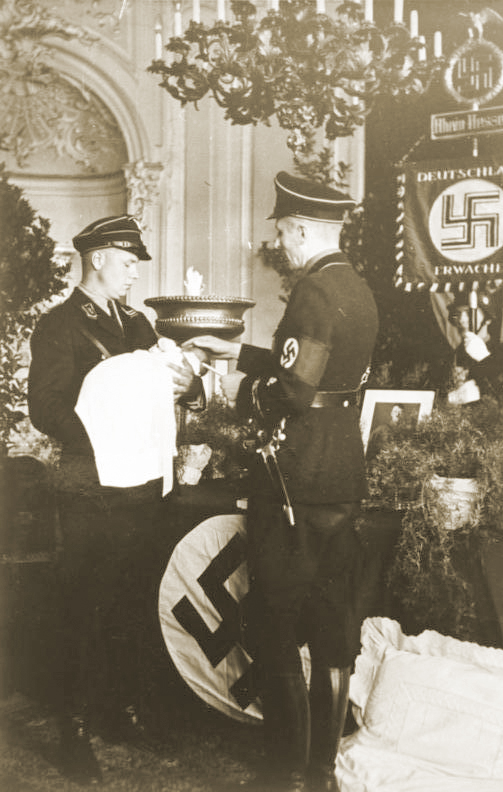 I recalled above the encouragement given by the Führer to the German birth rate. The German people, at once the most gifted in the West, the most disciplined and the toughest in war, were to be the main reservoir of the future European aristocracy.
I recalled above the encouragement given by the Führer to the German birth rate. The German people, at once the most gifted in the West, the most disciplined and the toughest in war, were to be the main reservoir of the future European aristocracy.
Hadn’t it already been the reservoir of the continent’s ancient aristocracy, the people from whom, along with the Franks, all the lords of medieval Europe had emerged (except for those of Scandinavian origin, who are also, by the way, Germanic)?
This reservoir had to remain inexhaustible. Now, ‘the exceptional being in a family is often the fifth, seventh, tenth or twelfth child’[1] and the limitation of births leads, in the more or less long term, to the downfall of the strongest peoples—just as it had, remarked the Führer,[2] brought about the end of the Ancient World by numerically weakening its patrician houses in favour of a plebeian population that unceasingly multiplied and provided more and more faithful followers to levelling Christianity. It was therefore necessary to honour the mothers of large families.
But it doesn’t follow that, like our friends of man, Adolf Hitler contemplated with satisfaction the idea of an Earth indefinitely exploited by an indefinitely increased population. Far from it! Even in Germany, the systematic encouragement of the birth rate and the protection of the healthy, good-bred child was coupled with a severe selection policy which, even before the seizure of power, the circulation of Mein Kampf had revealed to the public.[3] The law of the Third Reich, which was the very expression of this policy, provided for the sterilisation of the incurably ill, the sick, the deficient, and Germans of mixed non-Aryan blood—Jewish or otherwise—who were in danger of transmitting their physical or mental infirmities or their racial inferiority to their descendants. It formally prohibited, under penalty of forced labour, any marriage or extra-marital sexual relations between Jews and Germans or people of ‘related [artverwandt] blood’.[4]
Strict, as we can see for the people as a whole, it was even more so for the members of this elite corps—a true Nordic aristocracy, from all points of view—represented by the SS. They were required to marry. This was a duty to the race, and also an order from the SS Reichsführer, Heinrich Himmler.[5] And they were asked to have as many children as possible. But they could only choose a wife with the permission of the SS Bureau of Races (SS Rassenamt) which examined the girl’s family tree with the utmost rigour, as well as her state of health and that of her antecedents.
And if they had to give life profusely, they also had to be lavish with their own blood on every battlefield. They were entrusted with the missions that demanded the most sustained courage, the most superhuman endurance, the most total disregard for suffering and death. It is enough to compare the losses suffered by these men on all fronts, but especially on the Eastern Front, with those of other German military units and the best foreign armies, to feel how little the life of an elite individual, and a fortiori that of any individual, counted in National Socialist Germany when it came to serving the Reich.
It is true that the birth rate was encouraged, and all the more so because the physical and psychological quality of the parents was more perfect. It was true that no pure-blooded German man or woman should try to deceive nature by using contraceptives, and thus risk depriving the race of an exceptional subject. ‘Do we know what we lose as a result of limiting births? The man who was killed before his birth is the riddle’.[6]
But, on the other hand, war, that the Führer foresaw, even ‘after victory’, would remain almost permanent on the edges of the conquered territories, as it had been on the shifting borders of the Roman Empire: war, ‘the natural state of man’[7] as he put it, took charge and would continue to take charge of limiting the number of adults, so much so that an SS family could only foresee the probability of survival… if it had at least ‘four sons’.[8]
In other words, to the dream of perpetual peace in a stunted world, where Man would have made Nature the servant of his pleasures and health, Adolf Hitler opposed the dream of permanent struggle, of ‘perpetual revolution’, both the joy and the duty of the Strong, standing alone amid universal decay. To the comfortable law of the least effort, he opposed the old Law of the Jungle: the ideal of life both overflowing and precarious; of life in danger. To the formula that a ragged, emptied, pretentious and lousy youth was soon to diffuse in the nightmarish world that followed the collapse of the Reich (‘Make love! Don’t make war!’) he supported the law of the old English aristocratic law: ‘To breed, to bleed, to lead’—procreate, shed blood, be the leaders.
__________
[1] Libres propos sur la Guerre et la Paix, page 74.
[2] Ibid., page 254.
[3] Mein Kamp, especially pages 279-280 of later editions (1935, 1936, etc.).
[4] Nuremberg Laws of September 1935.
[5] Order No. 65 of 31 December 1931.
[6] Words spoken by Adolf Hitler in a table talk on 19-20 August 1941.( Libres propos sur la Guerre et la Paix, page 29).
[7] Rauschning, Hitler told me (op. cit.), page 22.
[8] Libres propos, page 74.
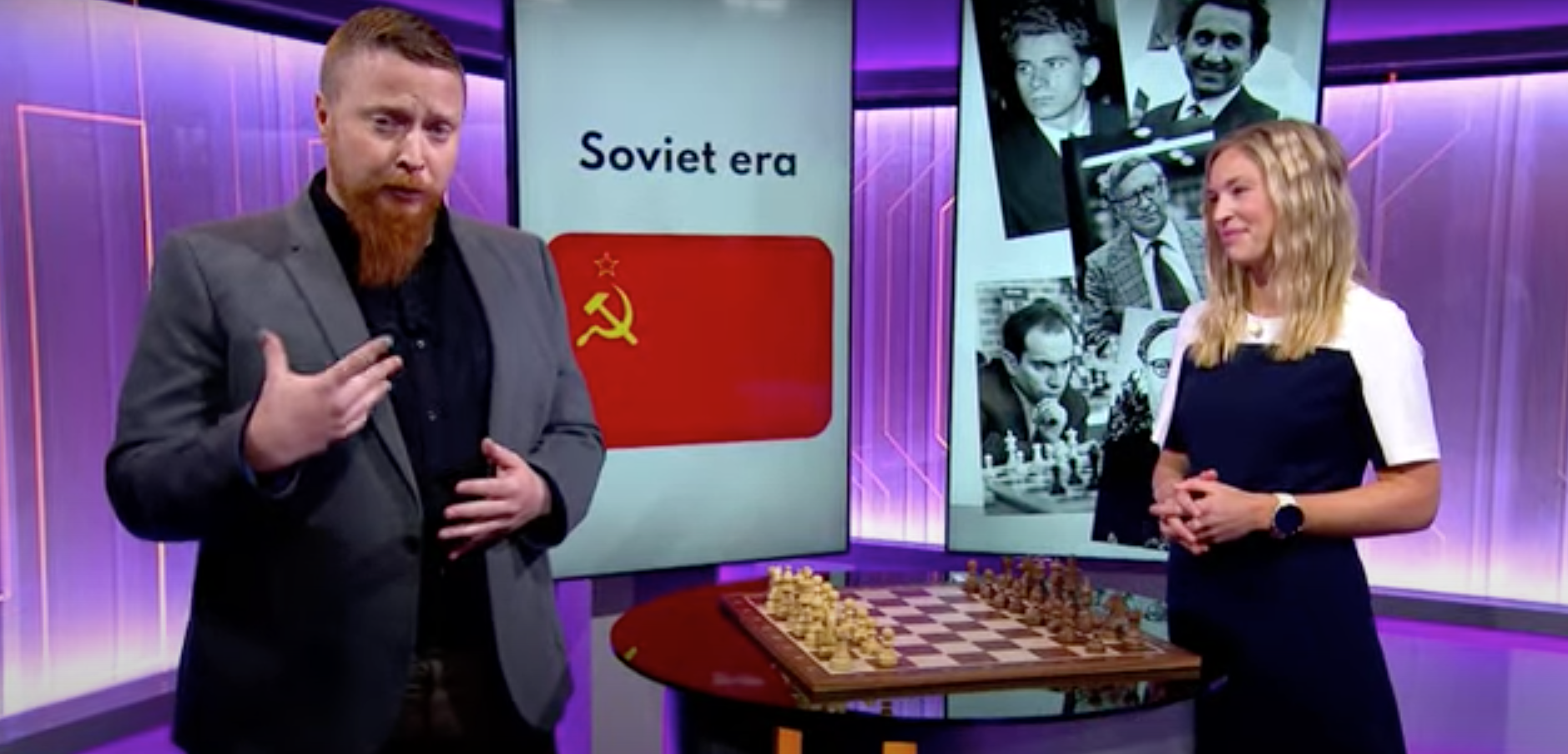 These days the World Chess Championship is being played between the world champion Magnus Carlsen (Norway) and the challenger Ian Nepomniachtchi (Russia), organised by FIDE (International Chess Federation). In the picture we see a red-haired chess Grandmaster commenting on the game played today, with pictures of the old Soviet-era world champions. Note that the USSR flag doesn’t bother the fans. As I have already said, the idol of my adolescence was Alexander Alekhine who had to flee, even as world champion, to Portugal after the defeat of Germany (Alekhine played several tournaments under the auspices of the Third Reich). We can already imagine a Nazi flag, with Alekhine’s picture, in a retrospective account of chess in the 1930s commented by the same red-haired master…
These days the World Chess Championship is being played between the world champion Magnus Carlsen (Norway) and the challenger Ian Nepomniachtchi (Russia), organised by FIDE (International Chess Federation). In the picture we see a red-haired chess Grandmaster commenting on the game played today, with pictures of the old Soviet-era world champions. Note that the USSR flag doesn’t bother the fans. As I have already said, the idol of my adolescence was Alexander Alekhine who had to flee, even as world champion, to Portugal after the defeat of Germany (Alekhine played several tournaments under the auspices of the Third Reich). We can already imagine a Nazi flag, with Alekhine’s picture, in a retrospective account of chess in the 1930s commented by the same red-haired master…
In The Human Side of Chess I said that I might play another FIDE tournament after sixteen years of not playing tournaments endorsed by the FIDE. But chess is no easy matter: one has to keep up to date, during preparation, with books on the latest opening analyses, where the authors often make use of computers. And it is true that I bought some books since I translated The Human Side of Chess into English. But those are not books that can be read like a novel. Rather, they resemble the maths books we had in junior and high school, when one had to do lots of exercises to assimilate mathematical concepts.
It seems to me a crime to spend so much time in chess when I should be acting as a priest of the fourteen words. I don’t mean I’m going to abandon the project of playing next year, but in an ideal world one would have to relegate the study of chess to a minimum. And this made me fantasize this morning what I would do if I had a special sponsor who would send me, for about a decade, enough money to order books to honour the sacred words.
My mind flew to the Open University of the UK (OU) books on the history degree, or rather, the classical studies degree. On this site I have translated the texts of a Spaniard on Sparta and Republican Rome. But formal study requires not only the basics of a BA (I wouldn’t have to formally subscribe to the OU, just order their books), but more specific studies about Sparta and Republican Rome.
Largely, studying chess is nothing more than a lack of funds, since one spends tons of time digesting a single chess book; it’s cheap to study this game at the amateur level. On the other hand, studying history is more expensive. Unlike the metaphor I have been using on this site, that of the three-eyed raven who in an inhospitable cave on the other side of the Wall can see the past paranormally, in the real world one needs not only the money to have a good collection of the Loeb Classical Library, but the time to read them, the security of sustenance and a roof over our heads. That is the only way to ponder what the Aryan race really was in the pre-Christian world.
There is something else. Recently I was thinking that, given that Christianity and secular neochristianity are axiologically the same, a neologism should be coined to encompass these two concepts in one. Upon reflection, I remembered the term ‘Jew obeyer’ which I first used on this site in 2018.
Indeed: Christians obey the precepts of the Jews who wrote the New Testament, and atheists indirectly obey them, albeit wrapped in the ideology born with the French Revolution (‘human rights’, etc.—cf. what Savitri said on anthropocentrism in today’s other post).
The only way for the priest of the 14 words to prove definitively that Christian ethics and the ethics of Western atheists are two sides of the same coin, is to steep himself in classical culture. In an ideal world I would inherit the fortune of a relatively wealthy man. With the proper funds it would no longer make sense to study, even a little, chess as long as I could ‘see’ the past through my classical studies.
After a few years of studying the classics, the question of whether there was anything like these ‘Jew obeyers’ among the Aryans of pre-Christian Europe would begin to dawn on me.
Presently, it seems to me that there was not: that there was nothing so much as an egalitarian hysteria where the last (the poor, the blacks, the trans) will be first and the first (the proud Aryans) will be last. My working hypothesis is that all this madness that has metastasised in our secular world today had, as its first cancerous cell, Mark’s gospel as we have been saying on this site when talking about Richard Carrier’s book. But we would have to be as sure of that as Carrier is now about Mediterranean religion in the first centuries of our era.
If I can’t do that formal study, it would be great if someone else could do it in the future. The premise that the ‘ethical’ system that is killing the Aryan originated from the mental virus of Christianity can be formally addressed by studying pre-Christian Europe.
I would like to use this post to thank a sponsor who sends me a fixed amount per month. If I had more such sponsors I could surely abandon the couple of chess books I am reading for a better cause.
Chapter IX
The reversal of anthropocentric values
Awaken, shake your chained forces
Let the sap flow in our dry furrows
Make sparkle, under the flowering myrtles
An unexpected sword, as in the Panathenaea—Leconte de Lisle (‘L’Anathème’, Poèmes Barbares)
Demographic growth is, as I have tried to show above, both a consequence and an ever-renewed cause of the development of techniques: a consequence of the preservation, thanks to the perfection of medicine and surgery, of an ever greater number of people who normally should not be living; and a cause of the efforts of inventive minds to create means of satisfying the needs, real or supposed, of a population that is multiplying, often dispite the absence of protective hygiene, and all the more so if such hygiene is widespread.
It is a vicious circle, and all the more tragic because it can probably only be broken on a global scale. It would be criminal to encourage, among the noblest and most gifted peoples, a decline in birth rate which would expose them, on equal terms (or simply in the fatal peace of a ‘consumer society’ indefinitely extended as technical progress) to give away to human varieties qualitatively inferior to them, but dangerously prolific, and whose demography is out of control.
No one was more aware of this fact than Adolf Hitler, and he gave it a place in his politics that it had never had under any regime, even a racist one, in the past. And it is perhaps in this more than in anything else that the blatant opposition of the Third German Reich to the leading trends of the modern world appears.
These tendencies are expressed in the hundred thousand times repeated precept ‘Live and let live’ applied (and this is to be emphasised) to men of all races as well as of all degrees of physical or mental health or illness, but to man alone. It is the contrary precept that our protectors of the sacrosanct two-legged mammal apply to quadrupeds, cetaceans, reptiles, etc., as well as to the winged gentry and the forest. Here, it is a question of ‘letting live’ at most what doesn’t hinder the indefinite expansion of any variety of man, and even, at the limit, only what favours this expansion. This seems to be the case in Communist China, where only ‘useful’, that is to say exploitable, animals have the ‘right to live’.
The eternal glory of Adolf Hitler—and perhaps the most striking sign that he was, par excellence, the man ‘against Time’: the man of the last chance for recovery, no longer partial but total—is that he transvalued this order of things. It is his glory forever to have, even in a country during the war, ‘let Nature live’: protect as far as possible the forests and their inhabitants; take a clear stand against vivisection; rejecting for himself all meat products and dreaming about gradually abolishing the slaughterhouses ‘after victory’, when he would have had his hands free. [1]
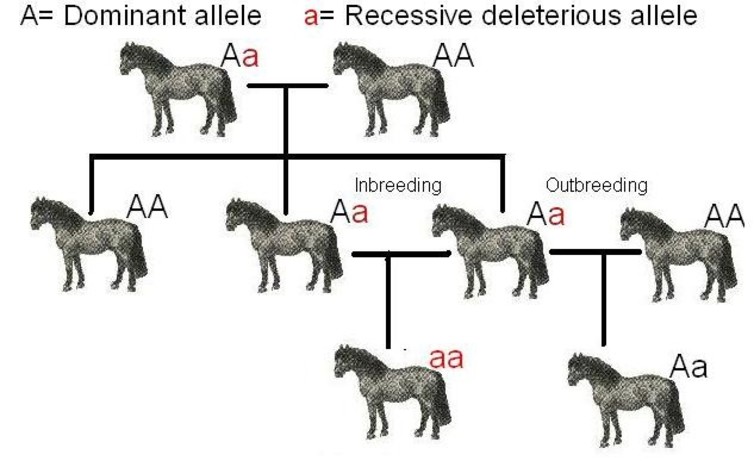 It is his glory that he has, in addition, mocked the misplaced zeal of lovers of ‘pedigree’ dogs, cats or horses, indifferent to the purity of their own offspring. He applied this time to man, in the name of the human elite, the very principle that had, for millennia, regulated man’s behaviour towards the beast and the tree: ‘Let live’ only that what didn’t hinder the flourishing of this elite; ultimately, only what favoured it—or at least he did all that was materially possible in this sense in a world where, despite his power, he still had to reckon with constant opposition.
It is his glory that he has, in addition, mocked the misplaced zeal of lovers of ‘pedigree’ dogs, cats or horses, indifferent to the purity of their own offspring. He applied this time to man, in the name of the human elite, the very principle that had, for millennia, regulated man’s behaviour towards the beast and the tree: ‘Let live’ only that what didn’t hinder the flourishing of this elite; ultimately, only what favoured it—or at least he did all that was materially possible in this sense in a world where, despite his power, he still had to reckon with constant opposition.
__________
[1] Statement by Adolf Hitler to J. Goebbels, 26 April 1942.
Today in the morning the first thing I did when I got up was to take a walk in the street. Whenever I go for a walk I think. Keeping in mind what we said yesterday about the pretentious academic profession called ‘philosophy’, I remembered a passage from my book El Grial that is worth translating into English:
______ 卐 ______
 In the mid-1970s, when I wanted to study philosophy, I treasured one of the most popular philosophical dictionaries in the Spanish language: that of the Italian philosopher Nicola Abbagnano. After sleeping for decades in an era that hid fundamental questions from me, when I became awake it occurred to me to see what Abbagnano’s dictionary of philosophy said about National Socialism, but there was no article about it. So I looked up the word ‘Racism’ and was in for a surprise. After a good introductory paragraph, Abbagnano wrote the most propagandistic falsehoods one can imagine, breaking even the tone of his usual academic prose. We mustn’t forget that Abbagnano finished writing his dictionary in 1960, when the West knew nothing about the Third Reich except Allied propaganda. It is therefore not surprising that an Italian professor had to bow to such a narrative. But I would like to focus on his article:
In the mid-1970s, when I wanted to study philosophy, I treasured one of the most popular philosophical dictionaries in the Spanish language: that of the Italian philosopher Nicola Abbagnano. After sleeping for decades in an era that hid fundamental questions from me, when I became awake it occurred to me to see what Abbagnano’s dictionary of philosophy said about National Socialism, but there was no article about it. So I looked up the word ‘Racism’ and was in for a surprise. After a good introductory paragraph, Abbagnano wrote the most propagandistic falsehoods one can imagine, breaking even the tone of his usual academic prose. We mustn’t forget that Abbagnano finished writing his dictionary in 1960, when the West knew nothing about the Third Reich except Allied propaganda. It is therefore not surprising that an Italian professor had to bow to such a narrative. But I would like to focus on his article:
Racismo (English racialism; French racisme; German Rassismus; Italian razzismo). The doctrine according to which all historical-social manifestations of man and his values (or disvalues) depend on race, and which enunciates the existence of a superior (‘Aryan’ or ‘Nordic’) race destined to be the guide of the human race. The founder of this doctrine was the Frenchman Gobineau in his Essai sur l’Inégalité des Races Humaines (1853-1855), aimed at defending aristocracy against democracy.
Not long ago, by the way, I added Count Gobineau’s book to my library, but let’s see what Abbagnano says next:
Towards the beginning of the 20th century a Germanophile Englishman, Houston Stewart Chamberlain, spread the myth of Aryanism in Germany in Die Grundlagen des XIX Jahrhunderts (The Foundations of the 19th Century, 1899), identifying the superior race with the Germanic race.
Here the problems begin, because that is not a myth. It is no coincidence that, until very recently, the Aryans have dominated culture, science, technology, and the political world.
Anti-Semitism dated back to ancient times in Germany and therefore the doctrine of racial determinism and the master race found easy dissemination there, resolving itself in support for anti-Semitic prejudice and the belief that there is a Jewish conspiracy for the conquest of world domination and that therefore capitalism, Marxism and, in general, cultural or political manifestations that weaken the national order are Jewish phenomena.
Here it is already raining ignorance. Abbagnano writes as if the Jewish problem were hallucinatory: a German prejudice. The best way to answer the late Abbagnano is simply to say that it is not hallucinatory. When Abbagnano was in his prime, Jews were over-represented not only among Lenin’s willing executioners, but the civic associations that lobbied to open the doors to mass non-white migration to the United States were Jewish. Those who doubt the veracity of these claims should read two books that document this, one by a Gentile and one by a Jew: Kevin MacDonald’s The Culture of Critique and Albert Lindemann’s Esau’s Tears.
After the First World War, racism was for the Germans the myth of consolation, the escape from the depression of defeat, and Hitler made it the foundation of his politics.
Abbagnano was a scholar. It seems improbable that he was unaware of a few things in Western history. The paragraph above implies that racism was a 20th-century German myth. The truth is that racism is millennia old: from the Aryans who invaded India and developed a Brahmanical religion so as not to contaminate their blood; from the ancient Egyptians who posted signs that no blacks were allowed in their lands beyond a certain latitude; from the blond Spartans of ancient Greece who had very strict rules to avoid interbreeding with non-Dorians, to the Visigoths who burned at the stake any Goth who married a mudblood in ancient Hispania. Republican Rome used to practice patrician inbreeding to avoid mixing with the lower classes; the patricians being more Aryan than the plebeians (not to mention the slaves). Racism was not Hitler’s invention. All that the Germans of the century in which Abbagnano and I were born did was to provide racism with the scientific basis, and the political impetus, that such a healthy instinct required. The philosopher’s ignorance continues:
The doctrine was elaborated by Alfred Rosenberg in The Myth of the Twentieth Century (1930). Rosenberg asserted a rigorous racial determinism. Every cultural manifestation of a people depends on its race. Science, morality, religion and the values they discover and defend depend on the race and are the expressions of the vital force of the race. Therefore, truth is always such only for a given race. The superior race is the Aryan, which from the North spread in antiquity through Egypt, India, Persia, Greece and Rome, and produced the ancient civilisations: civilisations that declined because the Aryans mingled with inferior races. All the sciences, the arts, the fundamental institutions of human life have been created by this race. Opposed to it is the parasitic Jewish anti-race, which has created the poisons of the race: democracy, Marxism, capitalism, artistic intellectualism, and also the ideals of love, humility, equality spread by Christianity, which represents a Roman-Judaic corruption of the teaching of the Aryan Jesus.
True, some National Socialists fantasised about an Aryan Jesus, Hitler included; but as we saw in the section on Jesus in my previous volume, 21st century New Testament studies have revealed that, in real history, Jesus of Nazareth didn’t even exist. But let’s return to the Italian philosopher. The reprint I own of Abbagnano’s Dictionary is from 1987. My original copy from the mid-1970s is now in the hands of a friend of the Arboledas Park [see The Human Side of Chess]. It is not worth quoting his entire article, ‘Racism’, pages 977-8 in the Fondo de Cultura Económica edition, but I should point out that it is on page 978 that the dictionary becomes nonsense. This is Abbagnano’s first nonsensical sentence: ‘There is no such thing as an “Aryan” or “Nordic’ race”.’ While it is true that, if one wants to write accurately one could say ‘ethnic group’ instead of ‘race’, the Nordics as an ethnic group do exist. The malevolence in an assertion like Abbagnano’s is similar to denying that races exist. Abbagnano’s second nonsensical claim deserves to be indented:
There is no proof whatsoever that race or racial differences influence in any way cultural manifestations or the possibilities for the development of culture in general. Nor is there any evidence that the groups into which mankind can be distinguished differ in their innate capacity for intellectual and emotional development. On the contrary: historical and sociological studies tend to reinforce the view that genetic differences are insignificant factors in determining the social and cultural differences between different groups of men.
I dare say that such a paragraph invalidates not only the article ‘Racism’ but the whole dictionary. What is the use of so much ontology, so much theory of knowledge, so much metaphysics and logic of academic philosophers if they are unable to see the most elemental thing of the empirical world? What value can the so-called social sciences like the sociological studies that Abbagnano mentions—opinions in fact—bring to us as opposed to the exact sciences? If there is one thing that has been clear since Darwin and his disciples in physical anthropology (Franz Boas’ ‘social anthropology’ is pseudoscientific), it is the difference in cranial capacity between, say, blacks and whites. Moreover, there are psychometric tests on baby blacks adopted into the homes of wealthy whites. Such studies not only show that IQ varies between races, but also between men and women. Among active chess players there are no black chess grandmasters. And the world championships have to be divided between men and women, while the latter have been unable to reach the crown that has been won by champions such as Capablanca, Fischer and Carlsen.
If there is one thing that raciology, the study of human races, teaches us, it is that genetic differences between humans are determining factors in social differences (I have already mentioned Jared Taylor’s group that brings together all these scientific studies). The ivory tower of philosophers like Abbagnano, who all they do is bend the knee before the current narrative, should be the laughingstock of anyone who has overcome political correctness.
There is also no evidence that breed mixtures produce biologically disadvantageous results. It is very likely that ‘pure’ races do not exist and have never existed over time. The social outcomes, both good and bad, of miscegenation can be attributed to social factors.
Passages like that move me to say that what goes on in the minds of academics like Abbagnano is on the level of the Byzantine discussions of other times: thinking of angels on the head of a pin instead of real and concrete facts. The notable Italian philosopher seems to be deliberately dissociating reality. Any honest Italian can see that the mixed people of Sicily with the Turks in the south belong to an inferior culture than the whiter Italians in the north of the peninsula. And let us not speak of how, by interbreeding with Indians and blacks, the Iberians produced an inferior stock to their Anglo-German counterpart north of the Rio Grande. What on earth is Abbagnano basing his statement that there is no historical evidence that admixture produces disadvantages in mestizo offspring? The answer is not hard to find. In the last paragraph of his article we see that Abbagnano subscribes, religiously, to the suicidal universalism of the West: the heritage of the universal Catholicism of his country’s church. Let us hear what Abbagnano, who was born and died in Italy, opines about racism:
…it is an extremely pernicious prejudice, because it contradicts and hinders the moral tendency of humanity towards universalist integration and because it turns human values, beginning with truth, into arbitrary facts that express the vital force of race and thus have no substance of their own and can be arbitrarily manipulated for the most violent or heinous ends.
Violent ends? Who were the biggest genocidaires in World War II, the racists or the anti-racists? The most common way of lying by academics and the media is omission. The classic case of lying by omission is the Holocaust of Germans perpetrated, after 1945, by the Allies when the Germans had already surrendered; not to mention Lenin’s and Stalin’s wilful executioners and their tens of millions of dead.
